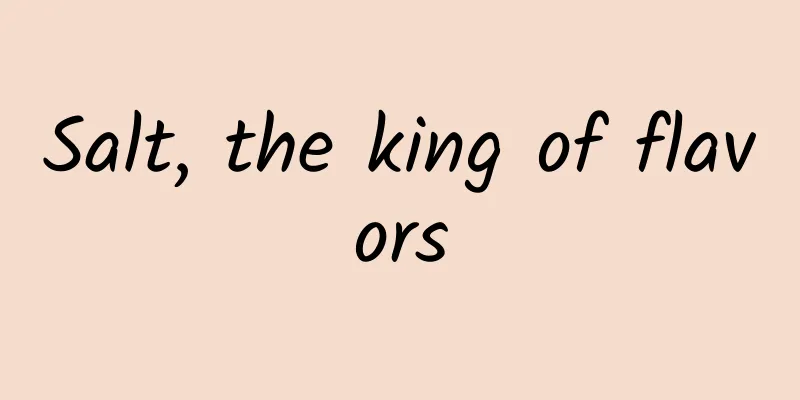Salt, the king of flavors

|
1. Where does salt come from? Salt is the "first of the five flavors" and the "king of all flavors". In ancient times, salt occupied a special position in the national economy. According to historical records, in the Yanhuang era 5,000 years ago in China, the Shusha clan used fire to boil seawater to make salt, which was the earliest "salt". In addition to "sea salt" made from seawater, there are also various types of salt, such as rock salt, pond salt, well salt, etc., depending on the raw materials and environment of salt production. Figure 1 Various types of salt Take a look: What kind of salt do we often eat at home? 2. The relationship between salt and sodium The salt we usually eat is composed of two elements: sodium and chlorine (chemical name: sodium chloride, NaCl). Sodium ions are one of the indispensable electrolytes. While maintaining the normal functioning of the body, sodium ions also have the function of regulating the balanced distribution of water in the human body and maintaining the balance of body fluids. Therefore, a moderate intake of salt is good for health. 3. Harm of Excessive Salt Intake to the Body Salt is so important to our daily life that we cannot live without it. However, consuming too much salt can bring health risks. A large amount of scientific evidence shows that eating too much salt is harmful to health and can lead to a variety of chronic diseases such as high blood pressure, cardiovascular disease and stroke, and increase the risk of gastric cancer and colon cancer. The amount of salt consumed per day is related to age. Generally speaking, it should not exceed 2 grams for children aged 2 to 3 years old, 3 grams for children aged 4 to 6 years old, 4 grams for children aged 7 to 10 years old, and 5 grams for children aged 11 and above. Test it: How many grams of salt do we use every day at home? How many grams does the average person consume? Figure 2 Salt intake 4. Tips for using salt In addition to being an indispensable condiment in our diet, salt is also very useful in our daily life. Let us learn some tips on using salt! 1. Brushing teeth to remove bacteria: There are records of people using coarse salt to clean their teeth in ancient times. Occasionally brushing your teeth with edible salt can relieve chronic inflammation and inhibit oral bacteria to a certain extent, thereby preventing tooth decay. 2. Slow down the oxidation of fruits: If the cut fruits are not eaten in time, the surface will turn yellow and black after a while. This is because oxidation reaction occurs on the surface of the fruits. If the fruits are soaked in water with a little salt, this phenomenon can be effectively prevented. 3. Make pasta more chewy: Adding some salt to the water before cooking noodles can make the noodles smoother and chewier, and the noodles will be clearly separated and not stick together; adding some salt when kneading the dough can improve the properties of the dough and make it chewier. 4. Adding salt to cooking will reduce oil splashing: Adding a little salt before cooking can prevent the oil from splashing after it is heated. This is because the ingredients poured into the pot usually contain water, which will cause the oil in the pot to splash. Adding salt will absorb the water in the pot and increase the boiling point of the oil, so that the oil in the pot will not splash out easily. |
<<: Products containing musk may cause early puberty. How should we choose cleaning products?
>>: [Medical Q&A] Do children need cough suppressant treatment when they cough?
Recommend
How to treat cervical erosion with electric heating?
Many women find that before they get married, the...
How to reduce armpit stretch marks?
After a woman gives birth, she is likely to devel...
Sleeping an extra hour a day can help you lose 20 pounds! Has a completely painless way to lose weight been found?
Reviewer of this article: Chen Haixu, Deputy Dire...
How does pelvic inflammatory disease develop?
Pelvic inflammatory disease is a common gynecolog...
What to do if you drink rice wine during pregnancy
Women need to pay special attention when they are...
How long after a caesarean section can I go out and see the wind?
Many ancient film and television works would &quo...
Is moxa fumigation useful for gynecological inflammation?
Gynecological inflammation is the most common gyn...
Belly shape of a girl born at 37 weeks of pregnancy
At 37 weeks of pregnancy, women will clearly feel...
What should I do if my menstruation is always irregular?
There are many reasons that lead to irregular men...
Can postpartum venous thrombosis be cured?
Giving birth to a child is the most anticipated t...
Is it easy to get pregnant with less menstrual flow?
Many female friends experience light menstrual fl...
"Health from Food" Series丨What foods are good for people with high uric acid?
The 2021 China Hyperuricemia and Gout Trend White...
What are gynecological inflammations?
Compared with men, women's reproductive syste...
What is the plant of antlers? How to preserve antlers?
Agar, also known as agar, is also quite common in...
Uterine polyp rupture and heavy bleeding
In our lives, many women suffer from uterine poly...









